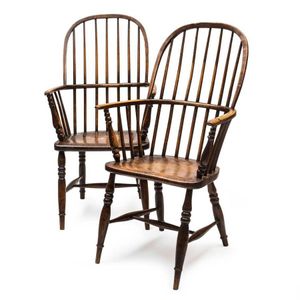George III Windsor Armchair
A George III Windsor elm and beech armchair, the hoop back with pierced splat and 'cone' spindles, shaped elm seat, the turned legs with shaped stretchers.
You must be a subscriber, and be logged in to view price and dealer details.
Subscribe Now to view actual auction price for this item
When you subscribe, you have the option of setting the currency in which to display prices to $Au, $US, $NZ or Stg.
This item has been sold, and the description, image and price are for reference purposes only.
- Splat - The central back support between the top rail and the seat in chairs and couches. They may take a variety of forms, and run either horizontally or vertically.
- Turning - Any part of a piece of furniture that has been turned and shaped with chisels on a lathe. Turned sections include legs, columns, feet, finials, pedestals, stretchers, spindles etc. There have been many varieties and fashions over the centuries: baluster, melon, barley-sugar, bobbin, cotton-reel, rope-twist, and so on. Split turning implies a turned section that has been cut in half lengthwise and applied to a cabinet front as a false decorative support.
- George Iii - George III (1738 - 1820) was King of Great Britain and Ireland from 1760 to 1820.
- Hoop Back - Used to describe the back of Windsor and other similar chairs where the back has a top rail bent around in the shape of a half-hoop.
- Spindles - Short turned pieces, used as stretchers or back supports mainly in cottage chairs, couches and day beds. Turned shelf supports and the railings used in the backs and arms of day beds during the late 19th century are also referred to as spindles. Until the coming of the industrial age, spindles, like all turned pieces, were made by hand, and should show some slight variation. With the introduction of the factory lathe, spindles and turned legs became quite uniform and standard.
- Beech - Beech, a pale coloured timber, is native to temperate Europe, Asia and North America and classified as a hardwood, although comparitively "soft" when compared with oak or ash. It has long been popular with with country craftsmen, particulary chair makers, as unlike ash it is suitable for turning.
- Pierced Decoration - Ornamental woodwork with part of the background cut through and removed to produce an open-work pattern.
- Turned Legs - are legs which have been turned on a lathe. In use from the 16th century, turned legs on tables, chairs and cabinets became more frequent until, by the 1830s, the Georgian square or tapered leg was rarely found except in country pieces.
- Cone - A popular decorative motif based on the shape of the pine cone, and used in silver ceramics and furniture. Because of its shape it is most suitable for use as a finial.
This item has been included into following indexes:
- chairs, singles - Georgian 550
- chairs, singles / pairs / threes, style or period
Visually similar items

Sold by
in
for
You can display prices in $Au, $US, $NZ or Stg.

Sold by
in
for
You can display prices in $Au, $US, $NZ or Stg.

Windsor chair, late 19th century oak spindle & crescent back
Sold by
in
for
You can display prices in $Au, $US, $NZ or Stg.

A Georgian fruitwood country Windsor chair, solid splat back, requires some attention. 61 cm x 41 cm x 96 cm
Sold by
in
for
You can display prices in $Au, $US, $NZ or Stg.
